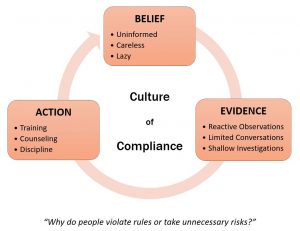
Confirmation bias is the tendency to process information by looking for, or interpreting, information that is consistent with one’s existing beliefs1. This biased approach to decision-making is largely unintentional and often results in ignoring inconsistent information. Existing beliefs can include one’s expectations in a given situation and predictions about a particular outcome. People are especially likely to process information to support their own beliefs when the issue is highly important or self-relevant.
In a previous article, I outlined the differences between two distinct cultures – compliance and commitment. This post describes how a confirmation bias can perpetuate a culture of compliance. I will also discuss how the conversations that take place in a work place with a culture of commitment minimize the potential for confirmation bias.
Culture of Compliance
The model below explains how confirmation bias influences decision-making (and the actions taken by managers) when an organization is managed through compliance.
It begins with a person’s existing beliefs.








